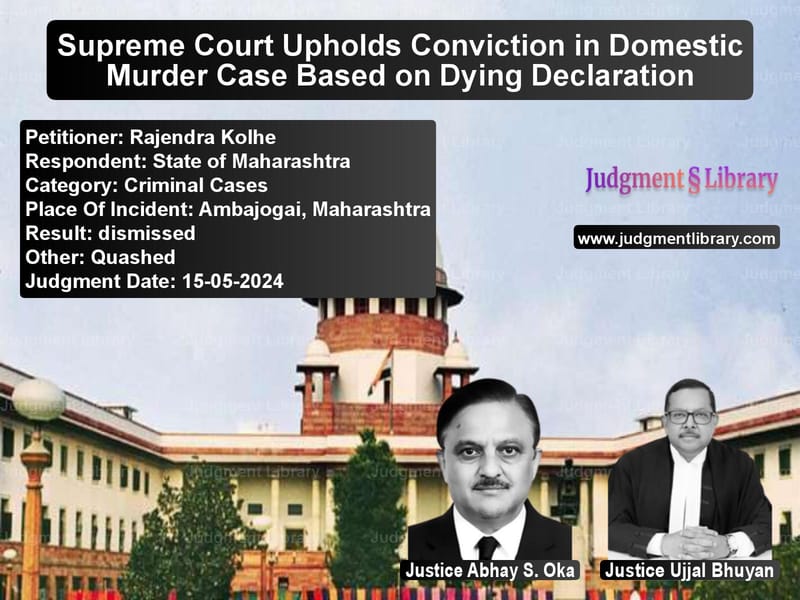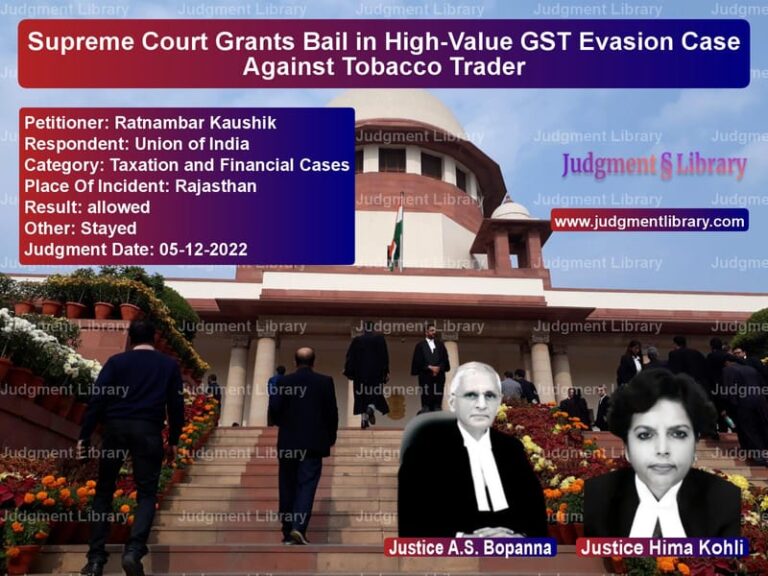Supreme Court Upholds Conviction in Domestic Murder Case Based on Dying Declaration
The case of Rajendra S/o Ramdas Kolhe vs. State of Maharashtra involves the tragic story of Rekha Dhokne, a police constable who was murdered by her husband and brother-in-law. The appellant, Rajendra, was convicted of the murder under Section 302 of the Indian Penal Code (IPC), based largely on the victim’s dying declaration. The Supreme Court upheld the conviction, ruling that the dying declaration was reliable despite some inconsistencies in the testimony of prosecution witnesses. This judgment underscores the importance of dying declarations in criminal cases and their admissibility in securing convictions.
Background of the Case
The case revolves around the murder of Rekha Dhokne, a police constable who had been subjected to ongoing domestic violence and cruelty by her husband, Rajendra Kolhe, and his family. On 22nd July 2002, Rekha was set on fire by her husband and brother-in-law, leading to her death two days later. The prosecution presented evidence of two dying declarations made by Rekha, both implicating her husband and brother-in-law. The defense argued that the death was accidental and the dying declarations were unreliable. However, the trial court found the evidence compelling and convicted Rajendra, sentencing him to life imprisonment. The High Court upheld the decision, and the case was brought before the Supreme Court.
Chronology of Events
- 22 July 2002: Rekha sustained fatal burn injuries after being set on fire by her husband and brother-in-law.
- 24 July 2002: Rekha passed away in the hospital after providing her dying declarations to multiple witnesses.
- 2006: The trial court convicted Rajendra Kolhe of murder based on the dying declarations.
- 2010: The High Court upheld the conviction and sentence of life imprisonment.
- 2024: The Supreme Court dismissed Rajendra’s appeal, affirming the conviction.
Legal Issues Considered
The Supreme Court addressed the following key issues in the case:
- Whether the dying declarations made by Rekha were reliable and admissible as evidence.
- Whether the evidence provided by the prosecution was sufficient to convict Rajendra Kolhe of murder.
- Whether the inconsistencies in witness testimony undermined the credibility of the dying declarations.
Arguments by the Appellant (Rajendra Kolhe)
The appellant’s defense, led by Senior Advocate, contended that:
- The inconsistencies in the testimonies of key witnesses, such as the police constables and Rekha’s family members, cast doubt on the authenticity of the dying declaration.
- The appellant had tried to save his wife, evidenced by his burns, and should not be convicted of murder.
- The dying declaration made by Rekha was not credible because of the lack of corroborating evidence and the apparent contradictions in the statements made by various witnesses.
Arguments by the Respondent (State of Maharashtra)
The prosecution, represented by the State of Maharashtra, argued that:
- The dying declaration, recorded in the hospital, was clear, consistent, and legally admissible as evidence under Section 32 of the Indian Evidence Act.
- Witnesses corroborated Rekha’s statement that her husband and brother-in-law had set her on fire, establishing the motive and the fact of the murder.
- Despite minor inconsistencies in witness statements, the core of the testimony remained intact, supporting the prosecution’s case that the appellant had committed murder.
Supreme Court’s Judgment
The Supreme Court, in its judgment, emphasized the following points:
“The dying declaration made by Rekha is found to be authentic and credible. Despite minor contradictions in the testimony of prosecution witnesses, the core facts as narrated by Rekha have been corroborated by medical evidence and other witnesses. The appellant’s conviction under Section 302 IPC is upheld.”
- The Court upheld the legal validity of the dying declaration as a piece of evidence, referencing previous judgments that established its importance in criminal cases.
- It was emphasized that the prosecution had proven beyond reasonable doubt that the appellant was responsible for the murder, supported by the dying declaration, forensic evidence, and witness testimonies.
- The Court noted that the inconsistencies in the testimonies of witnesses were natural, given the circumstances and the passage of time, and did not detract from the overall reliability of the evidence presented.
Impact of the Judgment
This ruling has several important implications for criminal law:
- Reliability of Dying Declarations: The judgment reinforces the principle that a dying declaration can be a key piece of evidence in murder cases, particularly when made in the presence of competent witnesses and medical authorities.
- Credibility of Witness Testimonies: The Court emphasized that minor contradictions or inconsistencies in witness testimony should not automatically discredit the entire case, especially when the core facts are consistent.
- Legal Precedent: The judgment serves as an important precedent for future cases involving dying declarations and their admissibility in court as reliable evidence for securing convictions.
Conclusion
The Supreme Court’s decision in Rajendra Kolhe vs. State of Maharashtra confirms the crucial role of dying declarations in criminal cases. Despite the defense’s arguments about contradictions in witness testimony and the appellant’s attempts to save his wife, the Court found that the evidence overwhelmingly supported the conviction for murder. This ruling highlights the importance of credible dying declarations and sets a significant precedent for the use of such declarations in securing justice for victims of domestic violence and murder.
Petitioner Name: Rajendra Kolhe.Respondent Name: State of Maharashtra.Judgment By: Justice Abhay S. Oka, Justice Ujjal Bhuyan.Place Of Incident: Ambajogai, Maharashtra.Judgment Date: 15-05-2024.
Don’t miss out on the full details! Download the complete judgment in PDF format below and gain valuable insights instantly!
Download Judgment: rajendra-kolhe-vs-state-of-maharashtra-supreme-court-of-india-judgment-dated-15-05-2024.pdf
Directly Download Judgment: Directly download this Judgment
See all petitions in Murder Cases
See all petitions in Domestic Violence
See all petitions in Bail and Anticipatory Bail
See all petitions in Judgment by Abhay S. Oka
See all petitions in Judgment by Ujjal Bhuyan
See all petitions in dismissed
See all petitions in Quashed
See all petitions in supreme court of India judgments May 2024
See all petitions in 2024 judgments
See all posts in Criminal Cases Category
See all allowed petitions in Criminal Cases Category
See all Dismissed petitions in Criminal Cases Category
See all partially allowed petitions in Criminal Cases Category







